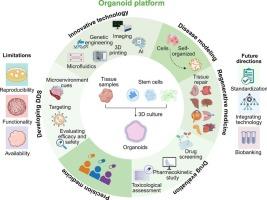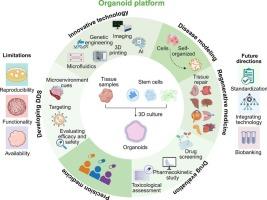Organoids as predictive platforms: advancing disease modeling, therapeutic innovation, and drug delivery systems
IF 11.5
1区 医学
Q1 CHEMISTRY, MULTIDISCIPLINARY
引用次数: 0
Abstract
As three-dimensional (3D), physiologically relevant models, organoids are rapidly becoming revolutionary platforms in biomedical research. With their ability to recapitulate tissue architecture, disease heterogeneity, and patient-specific therapeutic responses, organoids have revolutionized applications from disease modeling to precision medicine. In this review, we discuss recent advancements in engineering organoids through integrations with microfluidics, genetic editing, bioprinting, and artificial intelligence, which can collectively enhance microenvironmental control, functional maturation, and scalability. The multifaceted biomedical applications of organoids across disease modeling, regenerative medicine, drug evaluation, and precision oncology are also summarized. We further highlight the role of organoids in advancing drug delivery systems by validating targeting efficiency, therapeutic efficacy, and safety profiles. Finally, we address persistent challenges in vascularization, immune integration, and standardization while outlining future strategies for interdisciplinary innovation to harness organoids' full potential in reshaping biomedicine.


类器官作为预测平台:推进疾病建模、治疗创新和药物输送系统
作为与生理相关的三维模型,类器官正迅速成为生物医学研究的革命性平台。由于它们能够概括组织结构、疾病异质性和患者特异性治疗反应,类器官已经彻底改变了从疾病建模到精准医学的应用。在这篇综述中,我们讨论了通过与微流体、基因编辑、生物打印和人工智能相结合,工程类器官的最新进展,这些进展可以共同增强微环境控制、功能成熟和可扩展性。综述了类器官在疾病建模、再生医学、药物评估和精准肿瘤学等多方面的生物医学应用。通过验证靶向效率、治疗效果和安全性,我们进一步强调了类器官在推进药物传递系统中的作用。最后,我们解决了血管化、免疫整合和标准化方面的持续挑战,同时概述了跨学科创新的未来战略,以利用类器官在重塑生物医学方面的全部潜力。
本文章由计算机程序翻译,如有差异,请以英文原文为准。
求助全文
约1分钟内获得全文
求助全文
来源期刊

Journal of Controlled Release
医学-化学综合
CiteScore
18.50
自引率
5.60%
发文量
700
审稿时长
39 days
期刊介绍:
The Journal of Controlled Release (JCR) proudly serves as the Official Journal of the Controlled Release Society and the Japan Society of Drug Delivery System.
Dedicated to the broad field of delivery science and technology, JCR publishes high-quality research articles covering drug delivery systems and all facets of formulations. This includes the physicochemical and biological properties of drugs, design and characterization of dosage forms, release mechanisms, in vivo testing, and formulation research and development across pharmaceutical, diagnostic, agricultural, environmental, cosmetic, and food industries.
Priority is given to manuscripts that contribute to the fundamental understanding of principles or demonstrate the advantages of novel technologies in terms of safety and efficacy over current clinical standards. JCR strives to be a leading platform for advancements in delivery science and technology.
 求助内容:
求助内容: 应助结果提醒方式:
应助结果提醒方式:


